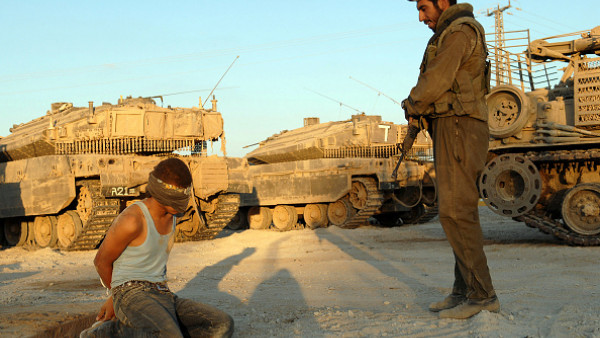Palestinian prisoners are often incarcerated on unfounded claims, and subsequently are put through starvation for several months [GETTY]
Like someone who emerged from a cave after an eternity, with deteriorating health and a dilapidated body, bodybuilding champion Moazaz Abayat, 37, came out of Israeli prisons after eight months of detention in a shocking condition.
His family, which was waiting for him at the gate of Ofer Military Prison, saw an emaciated man who couldn’t walk, supported by another man.
Both appeared exhausted, their shaggy hair and long beards making them look like they had come out of a grave.
Since October 7th, it has become common in the West Bank to find Palestinian prisoners in Israeli detention emerging looking completely different than they did before their arrest.
Human rights groups accuse Israel of practising torture, punishment, and starvation against thousands of Palestinians many of whom remain in prison until now.
An investigation published by the Israeli newspaper Haaretz reported that Israel deliberately use hunger as a weapon against Palestinian prisoners to enhance the torturous conditions set in detention. Abayat ‘s condition corroborates this.
His father, Khalil, told The New Arab that Moazaz Abayat had weighed more than 110 kg when he was arrested at his home in Bethlehem on October 26 during an Israeli raid in the West Bank, but he was released weighing no more than 45 kg.
Hospital tests revealed that he has a spinal fracture, a broken leg, and severe malnutrition.
“What hurts us most is that he didn’t recognise any of us,” his father said. “From time to time he screamed in fear of dogs. He told the doctor that during these months he had only eaten a few grains of rice and beans.”
When he left the prison, Abayat said that he had been subjected to a murder attempt in Ofer Prison, accusing Israeli National Security Minister Itamar Ben Gvir of personally assaulting him.
Crying, he added: “There are prisoners who are dying.”
Ben Gvir has called recently for the execution of Palestinian prisoners. He was appointed as the Minister of National Security in late 2022, a position that includes oversight of the Israel Prison Service.
His authority over the prison system has led to significant changes, particularly affecting Palestinian detainees. Ben-Gvir’s policies have been characterized by harsher conditions and measures perceived as punitive towards Palestinian prisoners, including overcrowding and the denial of basic rights and medical care.
“I Felt Like a Lab Rat”
Social media is flooded with pictures of Palestinian prisoners before and after arrest, showing signs of thinness, weakness, and fatigue. Many of these have been independently verified by human rights groups.
According to various testimonies, Israeli prisons have turned into cemeteries and lack the most basic living necessities such as food, clothing, and cleaning materials, leading to the spread of diseases among prisoners.
Banan Sharida, 24, from Nablus, was arrested with her sister Ibaa for two months while they were praying in Al-Aqsa Mosque last April.
She told TNA that female prisoners in Damoun Prison often have nothing more than a morsel of bread to survive, and that the little food they get is inedible or spoiled.
Meals are served three times a day, the last one at 3 pm, leaving prisoners with no food for the rest of the day. If combined, the three portions may equal to one meal outside of prison.
“Sometimes I felt like a lab rat on a dirty trail, testing your reaction to tasteless food and seeing how well you can handle this situation,” she said.
For months prisoners have been deprived of any salt and sugar, as well as meat. They say they are often served rotten vegetables and never fruits.
They are given one piece of chicken during the week, and the food comes either undercooked or burnt. Most female prisoners suffer from constipation, flatulence, and very severe cramping pains, Banan said.
“Even now I remember one of the girls screaming when she went to the bathroom while she was suffering from external hemorrhoids. They all suffer from dehydration because the water has an unpleasant taste.”
There were two pregnant prisoners with her who did not received appriopriate food.
Elderly female prisoners need special diets as they suffer from multiple diseases, which are obviously not available, according to Banan.
International humanitarian law requires occupying powers to provide food, clothing, and treatment to prisoners, a suitable place for detention and health services,
Helmi Al-Araj, director of the Hurriyat Center for Civil Rights, confirmed that starvation is used as a weapon by the Israeli prison guard against Palestinian prisoners to ensure slow, mass killing.
The limited food provided to the prisoners is of poor quality and doesn’t contain all required nutrients, which leads to them leaving the prison like ghosts, he explained.
“Prisoners feed on their own bodies, and this explains all this severe weight loss. They are fed uncooked or rotten food, which leads to poisoning and severe pain,” he told TNA.
According to him, what is happening is deliberate and planned under new policies introduced by Israeli Minister Ben Gvir.
Al-Araj said his center has provided international institutions with documents and testimonies transmitted from the released prisoners, but the international community has not yet put an end to these policies that violate international law.
The Prisoners and Ex-Detainees Affairs Commission estimates that the number of Palestinian detainees in the West Bank since October 7 is approximately 9,625, and this doesn’t include arrests in the Gaza Strip.


